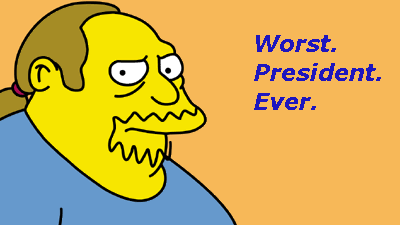
Originally Posted by
Marshal Murat
3. Kennedy - While he was very telegenic, his domestic programs were a failure, he deepened U.S. involvement in Vietnam, and while he did negotiate the 'Cuban Missile Crisis', it obscures his 'Bay of Pigs' assault. A man who died a 'martyr' but whose actual accomplishments had no or a negative impact, overall.
I think the only use of this sort of lists is in comparisons of more or less similar problems which Presidents had to confront. Sometimes that is instructive. When it comes to Bush and Kennedy, I think it is.
Your evaluation of Kennedy is harsh. At least two of his accomplishments were lasting: his support (mostly through his brother Robert) for the civil rights movement, and the infusion of a new spirit of optimism into American politics after the Sputnik episode, resulting in, among other things, a spectacular space program.
One of his major failures was the introduction of the doctrine of 'limited war', mainly through McNamara. Limited wars as such were a real phenomenon at the time and there was nothing wrong with their conceptualization. But the sting of the new doctrine was in the notion that limited wars were a 'calculated risk' for both sides and that the use of force would be rationally managed by both parties. McNamara thought war, politics and the human mind were eminently rational. Not so!
This misunderstanding led to what you called 'the deepened U.S. involvement in Vietnam'. I believe a similar misunderstanding has led to the deepened U.S. involvement in Iraq in 2003, a concept developed and practised by a latter-day McNamara, namely Donald Rumsfeld.
Both governments were mistaken in their trust in technology and calculated warfare, and both were mistaken about the nature of their enemies. Kennedy wanted to halt communism, but the force the U.S. was fighting, de facto, was Vietnamese nationalism. Bush wanted to halt terrorism, whereas the real U.S. opponent on the ground is Arab nationalism.
That doesn't mean that either Kennedy or Bush were stupid or malevolent. As Barbara Tuchman writes in The March of Folly, political foolishness is seldom a mere result of stupidity or 'wooden-headedness', it is just as much the result of power: 'We all know, from endless repetitions of Lord Acton's dictum, that power corrupts. We are less aware that it breeds folly; that the power to command frequently causes failure to think; that the responsibilty of power often fades as its exercise augments.'
Years later, McNamara acknowledged in his autobiography that he knew the U.S. could not win the war in Vietnam, no matter how much he tinkered with technology, management-based theories and counterinsurgency models.
Kennedy, too, knew that it wouldn't happen. Yet, he persisted.
There is a passage in Tuchman's book that is worth quoting extensively because of its parallel with Bush and Iraq.
Tuchman describes how, ten days into his office, Kennedy approved of a report by General Lansdale who wanted to introduce new 'advisors' to the South Vietnamese government, Americans 'who know and really like Asia and the Asians' and who would 'guide the South Vietnamese to American policy objectives'.
Not to their own objectives, mind you, but to American objectives.
Tuchman:
This flaw, too, with its implications, Kennedy recognized when he said: 'If it were ever to be converted into a white man's war, we should lose it as the French had lost a decade earlier.' Here was a classic case of seing the truth and acting without reference to it.
The American failure to find any significance in the defeat of the French professional army, including the Foreign Legion, by small, thin-boned, out-of-uniform Asian guerrillas is one of the great puzzles of the time. How could Dien Bien Phu be so ignored? When David Schoenbrun, correspondent for CBS, who had covered the French war in Vietnam, tried to persuade the President of the realities of that war and of the loss of French officers equivalent each year to a class at St. Cyr [the French West Point- AII], Kennedy answered: 'Well, Mr Schoenbrun, that was the French. They were fighting for a colony, for an ignoble cause. We're fighting for freedom, to free them from the Communists, from China, for their independence.'
Because Americans believed they were 'different' they forgot that they, too, were white.
It is hard to miss the obvious parallels.






 Reply With Quote
Reply With Quote













Bookmarks